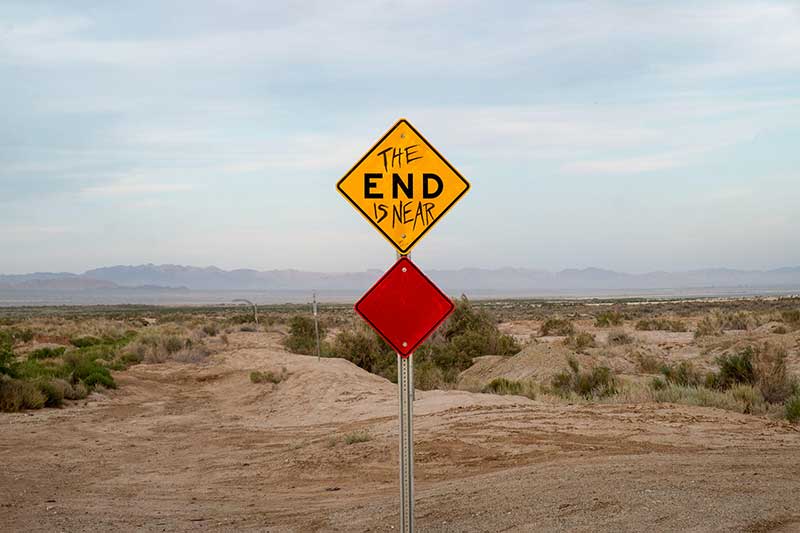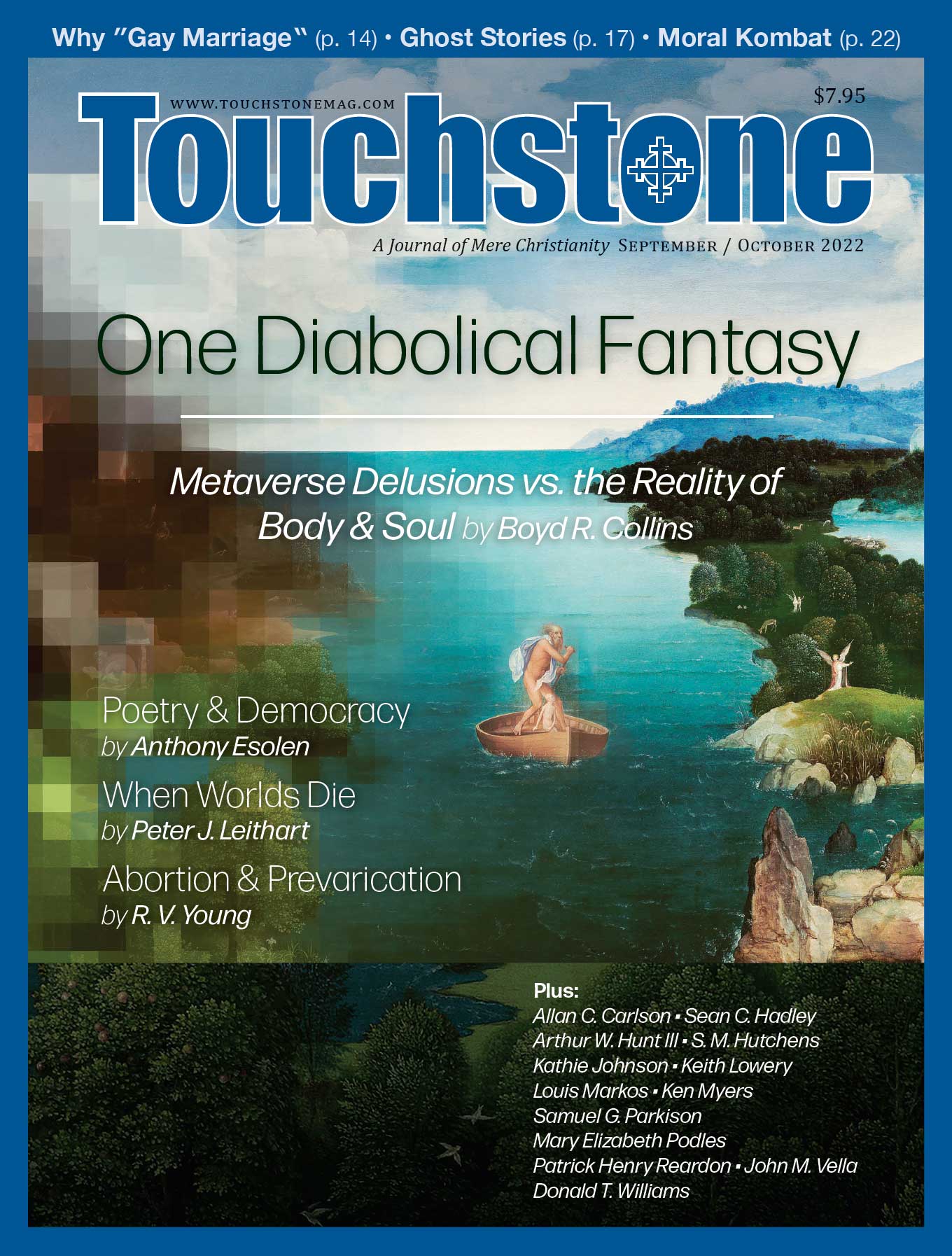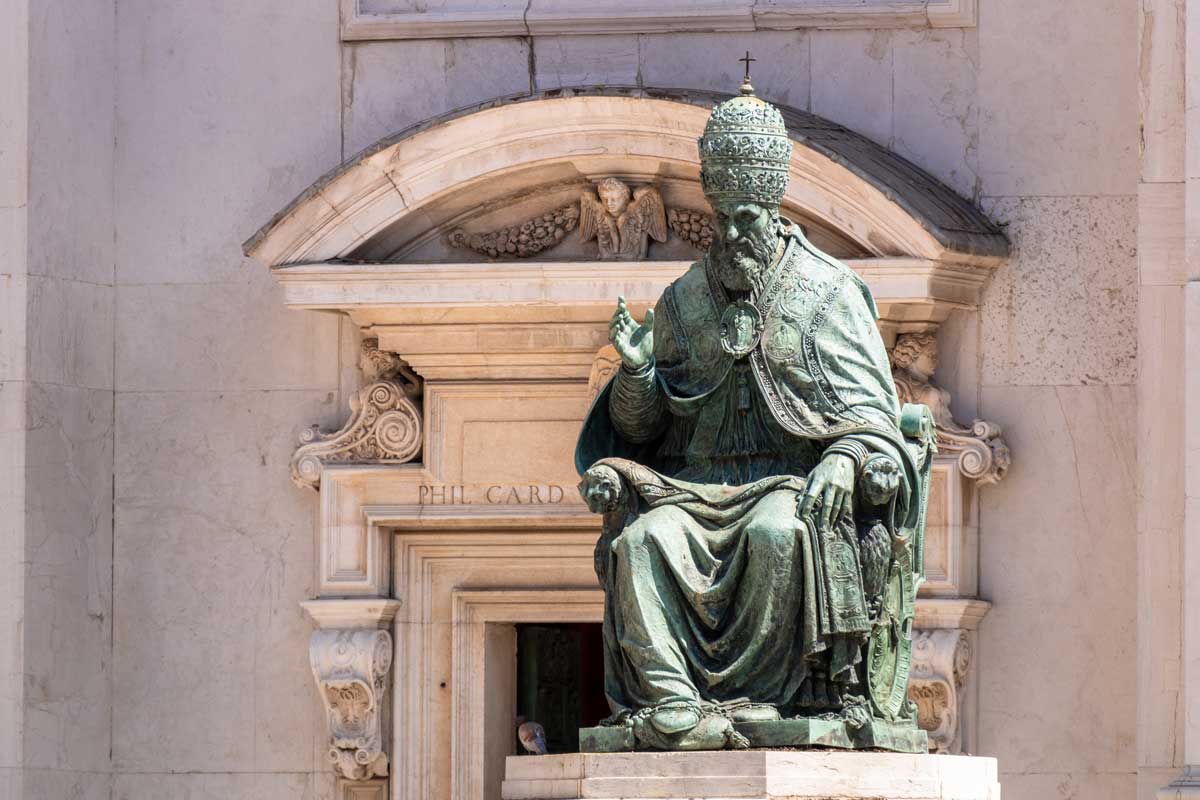When Worlds Die
Encouragement for Christians Preparing for the End
My text is Jesus’ apocalyptic discourse delivered on the Mount of Olives, known as the “Olivet Discourse,” recorded in slightly different forms in Matthew 24, Mark 13, and Luke 21. I’ll focus mainly on Luke but will fill in details from the other versions.
The key to the prophecy is Jesus’ statement, “Truly, I say to you, this generation will not pass away until all things take place” (Luke 21:32).
“This generation” is the generation that witnessed the ministries of John the Baptist and Jesus. It’s the generation that sat like children in the market, calling, “We played the flute and you did not dance; we sang a dirge and you did not weep.” “This generation” is the generation that accused the ascetic John of being demon-possessed and accuses the festive Jesus of being a glutton and drunk (Luke 7:31-34). It’s the generation that seeks for a sign but will be given only the sign of Jonah (11:29). It’s the generation that witnessed something greater than Jonah, but did not repent, something greater than Solomon, yet didn’t rejoice. This generation will be condemned by Ninevites and the Queen of the South (11:31-32, 50-51). It’s the generation that rejected Jesus, the generation living when Jesus suffered and died (17:25).
“This generation” never means the Jewish people, nor some future generation. “This generation” is always the evil and adulterous generation in which Jesus himself lived. The phrase refers to the people who lived at the same time he did, the people who saw his wonders and heard his words.
All the things Jesus speaks of in the Olivet Discourse will be accomplished before this generation passes. Before the last apostle tastes death, all these things will take place.
Days of Vengeance
What things will take place?
Nation will rise against nation, kingdom against kingdom. There will be wars and disturbances, earthquakes and plagues and famine, terrors and great signs from heaven. Jerusalem will be surrounded by armies. Desolation will come near. People in Judea will flee to the mountains. Pregnant and nursing mothers will be in danger. Jerusalem will be trampled by armies, and the times of the Gentiles will come to their fulfillment. There will be great distress in the land, wrath to the people. All in this generation.
Those are plausible first-century events. But then Jesus says, “The sun will be darkened, and the moon will not give its light, and the stars will fall from the sky, and the powers of the heavens will be shaken” (Matt. 24:29). Could these things happen before Jesus’ generation has passed? How?
Jesus is quoting Isaiah 13-14, a passage about the fall of Babylon. Sun, moon, and stars were created to rule the heavens and to mark out the times (Gen. 1:14-16). When the prophets say the sun turns black and the moon turns to blood, they’re describing an alteration in the political heavens. Powers and principalities are being eclipsed. Their time is over.
Jesus uses this imagery just as the prophets did. Before the end of Jesus’ own generation, before the last apostle dies, there will be a political revolution. The order of the world will collapse and give way to a new one.
The world that ended in the first century began a half-millennium earlier, with the Babylonian conquest. It was an imperial world. The Lord gave lands, people, and even animals into the hand of Nebuchadnezzar, whom he called “my servant” (Jer. 27). He anointed Cyrus as his shepherd to subdue nations, smooth out rough places, break doors of bronze, cut through iron bars, loosen the loins of kings, and to speak to Jerusalem, “Be built,” and to the temple, “Your foundation will be laid” (Is. 44-45). He gave the world to Alexander and his successors, then to the Caesars.
During this period, Jews were scattered among the nations. Some returned after the exile, but through most of this period, Israel had no king, and never a Davidic king. Despite its lack of political power, Israel was the center of the world, because the Jews were the caretakers of the temple of the God of heaven. Despite the boasts of Athenians and Romans, the temple and city of Jerusalem were the axis and umbilicus mundi.
When Jerusalem fell, that world order collapsed. After a.d. 70, a new world order was born. Between Nebuchadnezzar and Titus, Israel kept God’s house in the midst of powerful empires. After a.d. 70, the temple-city and the empire merge into a new thing, the church, which is both the fifth monarchy, the empire of the Son of Man, and a global temple of living stones.
Jesus predicts one of the major events of world history. From the Exodus until a.d. 70, God dwelt in a house in the midst of Israel, served by priests who led sacrificial worship. For the past 2,000 years, he has had no house, nor been served by a fleshly priestly order. The year a.d. 70 was an apocalypse, but a this-worldly apocalypse. It was a momentous revolution in world order.
Worlds Die
The Olivet Discourse is not a prophecy of the end of the world. Jesus prophesies the end of a world: TEOTWAWKI, “the end of the world as we know it.”
It wasn’t the first such revolution in the Bible. The world after Eden was submerged by the flood. The postdiluvian world was shattered at Babel; the world of the patriarchs ended in Egypt; the world of tabernacle-and-judges was overturned by the Philistine conquest; the Davidic dynasty ended with the exile; and the world of Israel-in-empire ended in the generation of Jesus, when the Romans destroyed the city and temple in the year 70.
The history of the West ever since has been marked by similar apocalypses. The Roman world collapsed in the fifth and sixth centuries; the Western medieval order was shattered by the Reformation; the world of Protestant and Catholic states was broken by the French Revolution. None of these revolutions marked a clean caesura. Features of the old world persisted, but they persisted in a different, alien context.
History isn’t a seamless web or a smooth, rippling flow. It’s marked by ends and new beginnings, by evenings, nights, and new dawns. Theologians sometimes set “history” in opposition to “apocalypse,” but that’s a mistake. History itself has an apocalyptic shape. The world has ended many times.
Are we living in the midst of an apocalypse? Are the upheavals of the present signs that a world order is collapsing? I think the answer is Yes. We’re not near the end of the world, but a world has been and is crumbling.
Let me point to one piece of evidence: In Romans 1, Paul describes how God responds when men suppress the truth and devote themselves to idols. He judges us by giving us over to our sin. First, he releases us to sexual confusion, including unnatural same-sex desires. As we persist in those ungodly desires, he gives us over to more general moral, social, and political confusion. He makes the world go mad.
We live in such a world. We are far down the Romans 1 path.
When the End Comes
Jesus told his disciples what would happen before the end, and the dynamics are the same before every end. If we’re in an apocalyptic moment, we’ll face the same pressures. What happens with world’s end? What happens when the sun goes dark and the moon turns to blood?
There’s political upheaval. Nations rise against nations, kingdoms against kingdoms. Powers that once shone like the sun are brought down. Dominant powers are shaken, as new powers rise.
But these political events are marginal to the main action. They are the “beginning of birth pangs” and “not the end.” The primary focus of every apocalypse is the people of God, which will suffer persecution, contend with false prophets, be wracked by apostasy. Jesus’ focus isn’t on the political turmoil. He’s focused on his disciples. That should be our focus, too. What do we do? What don’t we do?
Don’t Look Back
Look ahead. As the world dissolves, we’re tempted to try to shore up crumbling institutions. Save the public schools. Save the media. Save the federal government. Save the mainline churches. We’re liable to be paralyzed by nostalgia for the world we have lost.
There’s a time for reform, but there’s also a time to flee Jerusalem. There’s a time to stop patching up ruins and to give our lives to building the world of the future.
In my judgment, we’re in that time now. Don’t look back. Look ahead. Let the dead bury their dead.
Don’t Go Silent
Bear witness. Jesus warns his disciples they will experience tribulation and persecution. “They will lay hands on you and will persecute you, delivering you to the synagogues and prisons, bringing you before governors for my name’s sake” (Luke 21:12).
That’s our future; perhaps for some of you it’s already your present. Some of you will be brought before supervisors, HR departments, petty bureaucrats, social services, perhaps before school boards or city councils. Things will get worse, probably a lot worse.
You’ll be asked to give an account of yourself: Why are you not willing to put the pride flag up at your desk? Why don’t you call your bearded colleague “she”? How can you be so un-American as to support the overturning of Roe v. Wade? Why are you teaching your children to be anti-science by teaching them God created the world? You protest a drag queen dancing at a school assembly: What are you? A bigot? A transphobe? Your discipline of your children is child abuse.
Our current rulers don’t just disagree with our beliefs and practices. They find them repulsive.
Jesus tells his disciples their persecutors will be fellow Jews. They will be hauled in and tried in the synagogues of which they are members. Jesus makes this explicit a few verses later: “You will be delivered up even by parents and brothers and relatives and friends” (Luke 21:16). For us, too, opposition will come not just from outsiders. Family members will become enemies, as will other believers.
Persecution intensifies in a self-reinforcing cycle. When persecution breaks out, some Christians won’t stand. They’ll buckle under the pressure. Jesus predicts this, too, in Matthew’s version of the discourse: “Many will fall away” (24:10). This is the great apostasy that is all over the New Testament. It’s one of the main themes of Hebrews and 2 Thessalonians, and it’s the falling away that Paul tells Timothy will occur in the “latter days.”
Many who buckle to persecution become persecutors. “Many will fall away,” Jesus says, and then immediately afterward, “and will deliver up one another and hate one another” (Matt. 24:10). Cowardly Christians will blame faithful Christians for the persecution: if you wouldn’t be so provocative, if you’d just go along, if you weren’t so contrarian and reactionary, if you were more winsome, we wouldn’t be in this mess. Christians will join the persecutors to silence their brothers who say inconvenient things, who speak openly about sin, righteousness, and judgment. Persecutors treat Christians as scapegoats, and other Christians are ready to join in.
It’s not just the HR department you have to worry about. Pastors, local church councils, bishops, and presbyteries will bring you up on charges. To protect themselves, they’ll stake out a position next to the persecutors, even if they don’t join the persecution. They’ll pose as “good Christians,” and try to convince the world that their accommodating, tolerant, peaceable form of Christianity is true Christianity. They’ll paint the rest of us as bigots and dangerous cultists.
Arrests and trials aren’t unfortunate deviations from our mission. These are the mission. When they take you before kings and governors, says Jesus, “it will lead to a testimony for you” (Luke 21:13). He promises to give his disciples words and make their testimony so powerful that their opponents won’t be able to resist or refute them (21:15).
Nor is persecution a defeat. I don’t minimize the danger of persecution, and the possibility of successful persecution. But God is in heaven. He hears the cry of the oppressed. There is a Judge who judges on the earth. Late or soon, those who do not love life even to death will be vindicated. The beheaded will occupy thrones in heaven.
If that isn’t true, then the gospel isn’t true, because the gospel is nothing but the good news of a vindicated Witness.
Witness isn’t safe, and it’s not the way of survival. But it’s the way of victory. Witness overcomes the world.
Consider, as a footnote: The twentieth century was the great century of martyrdom in Christian history. In a controversial 2008 book, Antonio Socci estimated that two-thirds of the 70 million Christian martyrs through the centuries were killed after 1900. He estimates that 45 million people (some say closer to 25 million) have been killed, mostly by communists and Muslims. Do you think their blood is unrelated to the global shaking that began in 2001?
Don’t Hoard
Sell and give. We won’t be able to let the dead bury their dead or to stand firm against persecutors as long as we genuflect at the altar of Mammon. And we’re all in its grip. We adore our comforts and conveniences, our incredible wealth and distracting entertainments. We’re willing to tolerate corruption, evil, and decay so long as we get our nightly dose of Netflix opium. We need to shatter Mammon as we break every other idol.
When crisis looms, our instinct is to hoard. A virus is breaking out across the world, so we stock up on toilet paper. Violence is spreading and supply lines are interrupted, so we build a bomb shelter and order a truckload of freeze-dried food. But going into survival mode is another manifestation of the idolatry of Mammon.
We need goods and we need to save, but we store goods in order to share them. When persecution broke out against the early Christians, wealthy members sold their houses and lands and distributed the proceeds to impoverished brothers and sisters. Believers could be bold witnesses because they knew their brothers would cover their losses.
Your friends are going to lose jobs. They’re going to be outcasts and pariahs. If they’re fearful about their economic future, they’ll buckle. If they know the church will provide, they’ll be more likely to stand fast. Put a line item in your church budget for “Aid to the Persecuted.” Some churches will spend it on their own members. If there’s money in the budget at the end of the year, send it to Nigeria, where our brothers and sisters really need it.
That’s how you face an apocalypse: not by hoarding clothes, but by clothing the naked; by stocking up food in order to feed the hungry; by not storing up treasures on earth, but treasures in heaven.
Don’t Retreat
Serve, and expect to rule. Rod Dreher is right: in the current cultural and political climate, we need to cultivate close and purposeful Christian communities. They will only thrive if they’re faithful churches that are deeply rooted in Scripture, sing psalms, are constant in prayer, and gather regularly at the Lord’s table. We need to be devoted to training children in discipleship. We need self-policing communities, where members edify one another, correct one another, encourage one another.
But we must resist the temptation to become ingrown. Communities aren’t Christian if they exist only for their own perpetuation. Jesus came to save the world; the church is his body. A church that doesn’t bring life to the world isn’t a functional member of the living Christ, the Sent One. Tactical retreat has to be part of a strategic advance.
There’s no shortage of opportunities. Every church in the country is surrounded by needs, desperate ones. Drug addicts in middle-class suburbs. Lonely and lost kids. Unwed mothers and broken homes. Talk to the local police and the mayor. Talk to local bureaucrats and find out what they’re facing. See if your congregation has resources that can help.
Crucially, we must find ways to serve and love our enemies and persecutors. Martin Luther King Jr. put it inimitably. Love says to the enemy:
We shall match your capacity to inflict suffering by our capacity to endure suffering. We shall meet your physical force with soul force. Do to us what you will, and we shall continue to love you. We cannot in good conscience obey your unjust laws, because noncooperation with evil is as much a moral obligation as is cooperation with good. Throw us in jail, and we shall still love you. Send your hooded perpetrators of violence into our community at the midnight hour and beat us and leave us half dead, and we shall still love you. But be ye assured that we will wear you down by our capacity to suffer. One day we shall win freedom, but not only for ourselves. We shall so appeal to your heart and conscience that we shall win you in the process, and our victory will be a double victory.
Serve and expect to transform your communities. As Rodney Stark has argued in detail, this is how the early church transformed the cities of the empire. Christians welcomed strangers, provided social and financial capital to those who were displaced, nursed the sick. Over a few generations, cities changed from predominantly pagan to predominantly Christian. We don’t just respond to evil with good. We overcome (nika) evil with good (Rom. 12:21). Doing good is the way of triumph.
Expect to gain responsibility and authority as you serve your community. Israel was scattered among the nations as a defeated, subject people. They lost their land, their king, their temple. Almost immediately, God put Daniel and his three friends in high positions in the Babylonian Empire. And it continued through the rest of the exile. All the heroes of the exile were prominent insiders in the courts of the Babylonian and Persian kings—Nehemiah, Esther, Mordecai. In the face of Roman bigotry, Jews rose to high positions throughout the empire. Expect God to do it again.
Don’t Despair
Hope. Our sights are too narrow. We get focused on the collapse of our immediate world and lose sight of the fundamental meaning of history. The big story of the world isn’t the story of America, or of Western civilization. Those are big stories, but not the biggest. The big story is about the kingdom and city of God, about Jesus, King of kings, and his body, the church. Whatever is happening at the moment in the United States or the world is part of the unfolding fulfillment of the promise to Abraham to bless all the families of the earth.
Don’t be satisfied with survival. Trust in the promises of God and the God of promise. Hope in God, who is the help of our countenance and our God. Whatever terrors threaten, we’re players in the drama of the victory of God.
Peter J. Leithart is an ordained minister in the Presbyterian Church in America and the president of Trinity House Institute for Biblical, Liturgical & Cultural Studies in Birmingham, Alabama. His many books include Defending Constantine (InterVarsity), Between Babel and Beast (Cascade), and, most recently, Gratitude: An Intellectual History (Baylor University Press). His weblog can be found at www.leithart.com. He is a contributing editor of Touchstone.
subscription options
Order
Print/Online Subscription

Get six issues (one year) of Touchstone PLUS full online access including pdf downloads for only $39.95. That's only $3.34 per month!
Order
Online Only
Subscription

Get a one-year full-access subscription to the Touchstone online archives for only $19.95. That's only $1.66 per month!
bulk subscriptions
Order Touchstone subscriptions in bulk and save $10 per sub! Each subscription includes 6 issues of Touchstone plus full online access to touchstonemag.com—including archives, videos, and pdf downloads of recent issues for only $29.95 each! Great for churches or study groups.
Transactions will be processed on a secure server.
more on culture from the online archives
more from the online archives
calling all readers
Please Donate
"There are magazines worth reading but few worth saving . . . Touchstone is just such a magazine."
—Alice von Hildebrand
"Here we do not concede one square millimeter of territory to falsehood, folly, contemporary sentimentality, or fashion. We speak the truth, and let God be our judge. . . . Touchstone is the one committedly Christian conservative journal."
—Anthony Esolen, Touchstone senior editor













